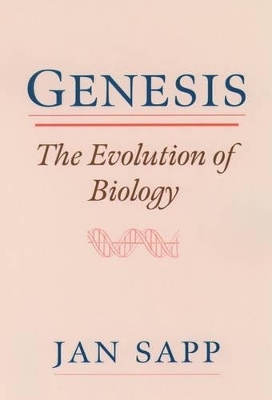
Genesis
The Evolution of Biology
Seiten
2003
Oxford University Press (Verlag)
978-0-19-515619-5 (ISBN)
Oxford University Press (Verlag)
978-0-19-515619-5 (ISBN)
What is evolution? What is a gene? How did these concepts originate and how did they develop? This book is a short history ranging from Lamarck and Darwin to DNA and the Human Genome Project, exploring the conceptual oppositions, techniques, institutional conditions and controversies that have shaped the development of biology.
This book presents a history of the past two centuries of biology, suitable for use in courses, but of interest more broadly to evolutionary biologists, geneticists, and biomedical scientists, and general readers interested in the history of science. The book covers the early evolutionary biologists-Lamarck, Cuvier, Darwin, Wallace, etc., through Mayr and the neodarwinian synthesis, in much the same way as other histories of evolution have done, bringing in also the social implications, the struggles with our religious understanding, and the interweaving of genetics into evolutionary theory. What is novel about Sapp's account is a real integration of the cytological tradition, from Schwann, Boveri, and the other early cell biologists and embryologists, and the coverage of symbiosis, microbial evolutionary phylogenies, and the new understanding of complete microbial genomes. The book as a whole will serve as a good introduction to the rise of modern biology over the past two centuries.
This book presents a history of the past two centuries of biology, suitable for use in courses, but of interest more broadly to evolutionary biologists, geneticists, and biomedical scientists, and general readers interested in the history of science. The book covers the early evolutionary biologists-Lamarck, Cuvier, Darwin, Wallace, etc., through Mayr and the neodarwinian synthesis, in much the same way as other histories of evolution have done, bringing in also the social implications, the struggles with our religious understanding, and the interweaving of genetics into evolutionary theory. What is novel about Sapp's account is a real integration of the cytological tradition, from Schwann, Boveri, and the other early cell biologists and embryologists, and the coverage of symbiosis, microbial evolutionary phylogenies, and the new understanding of complete microbial genomes. The book as a whole will serve as a good introduction to the rise of modern biology over the past two centuries.
Part I: evolution and revolution; the origin; Darwin's champions; Darwinism and socio-political thought; mutualism; dissent from Darwin. Part II: the myth of cell theory; the body politic; evolving embryology; the egg. Part III: Mendel Redux; emerging genetics; Darwinian renaissance; genes, germs, and enzymes; genetic heresy. Part IV: conceiving a master molecule; beyond the genome; molecular evolution and microbial phylogeny; symbiomics; the evolution of relationships.
| Erscheint lt. Verlag | 25.9.2003 |
|---|---|
| Verlagsort | Oxford |
| Sprache | englisch |
| Maße | 236 x 153 mm |
| Gewicht | 535 g |
| Themenwelt | Geisteswissenschaften ► Geschichte |
| Naturwissenschaften ► Biologie ► Evolution | |
| ISBN-10 | 0-19-515619-6 / 0195156196 |
| ISBN-13 | 978-0-19-515619-5 / 9780195156195 |
| Zustand | Neuware |
| Haben Sie eine Frage zum Produkt? |
Mehr entdecken
aus dem Bereich
aus dem Bereich
Wie die Vernichtung der Arten unser Überleben bedroht - Der …
Buch | Softcover (2023)
Penguin (Verlag)
CHF 20,95


